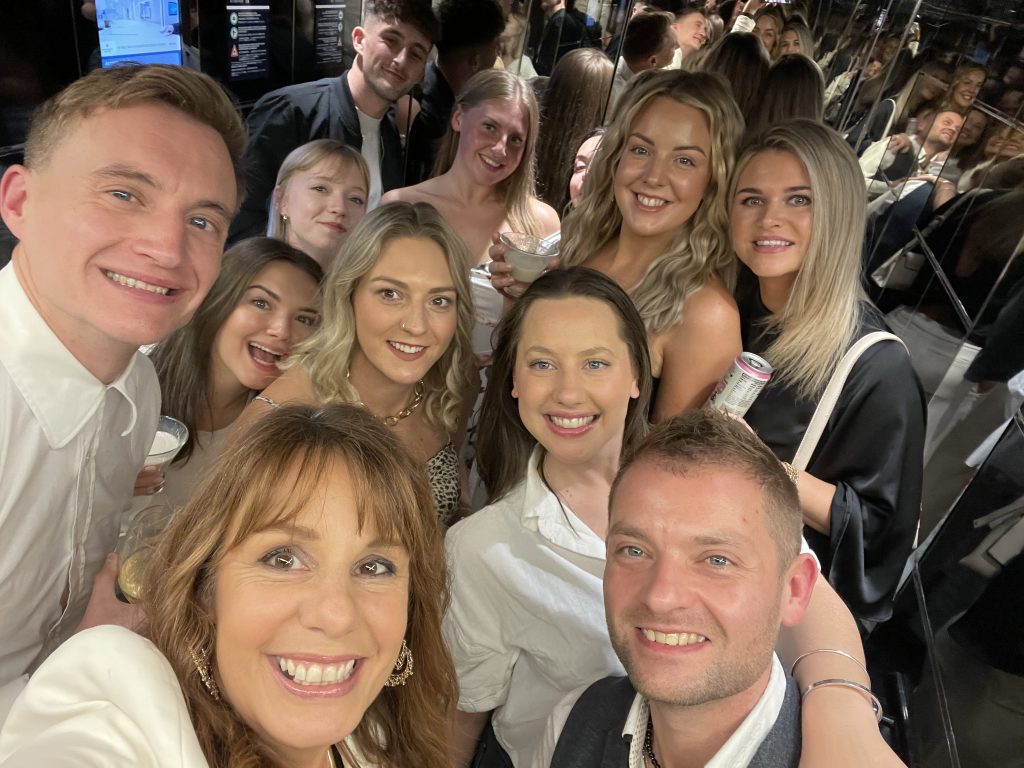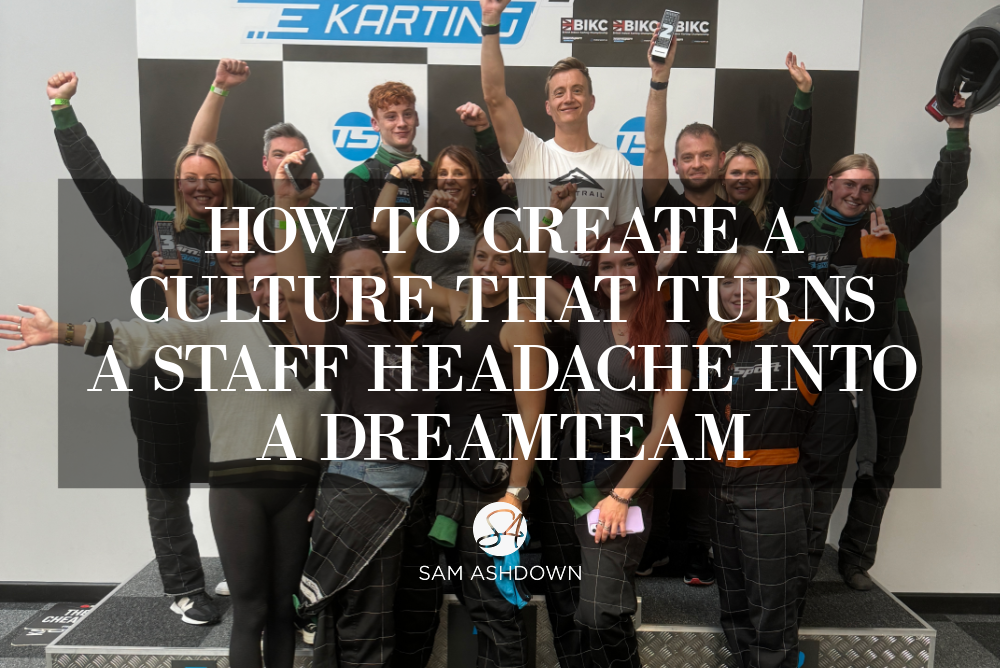Culture is the lifeblood of your company. It’s your company spirit, energy and character. You cannot grow a successful business without making sure your culture is defined, implemented and lived in your company, every day.
‘Culture eats strategy for breakfast.’ – Peter Drucker
But what is culture, exactly? And how does it differ from say, core values, purpose or vision?
The main challenge with the idea of culture is that it’s intangible; you can’t see or touch it. But you can see and touch its effects. Cultures can be people-based, like fun, collaborative and supportive. Or they can be product-based, like innovative, creative and future-paced. Your culture is created by you and the people you work with – employees, clients and suppliers.
‘Culture is often confused with having free food, beanbags and office dogs. High-performance culture has a lot more to do with the way the team interacts, the quality of people who stay, the quality of people who leave and the clarity each person has for their role.’ – Julia Langkraerhr, Bold Clarity Brand Consultancy
The Three Fundamental Elements of Culture
1. Mission
2. Vision
3. Core values
Culture also includes other seemingly unrelated factors, like the office environment, your employees’ appearance, the different characters on your team, your company’s marketing and your own personality and values.
Put all these ingredients into a big pot and what is created is your culture.
“Culture is a set of living relationships working toward a shared goal. It’s not something you are. It’s something you do.” – Daniel Coyle, ‘The Culture Code’
Five reasons why culture matters
1. A great culture usually means great performance; looking at the most successful companies of today, they’re almost all correlated with a high culture score.
2. Culture is what makes your company unique. Many aspects of what your company does can be copied, but not your culture
3. A healthy culture creates a flexible, people-first approach to challenges, and helps particularly in times of change
4. A strong culture builds an empowered workforce who will always have the company’s best in mind when making decisions, even in your absence
5. A culture that brings everyone together makes for a more enjoyable workplace, happier employees and less stress for you.
Culture in action
Let me introduce you to ‘MacDonalds’ Estate Agents’ – a fictional corporate estate agency with 50 offices. As a mass-market agency, we could imagine their mission might be ‘to have a sale board on every street in the UK’, and maybe their vision would be ‘To be the biggest estate agent in the country’.
Perhaps their core values would be things like:
- Customer first
- Professional expertise
- Consistently high standards
Their offices would be designed to be standardised, with the same furniture and décor in each. They might provide employees with uniforms, and marketing would be handled centrally, to ensure consistency of brand message. With MacDonalds’ Estate Agents, the personality and values of the founder are irrelevant. In fact, there may not be a ‘face’ of the brand at all, but instead, an incognito board whose members run the company remotely.
Let’s compare this culture with that of a small, local independent agency: ‘Downton’s & Daughters’ – a single-branch agency in a small market town run by Mr Downton and his three daughters. Mr Downton’s mission is ‘To help generations of families move to their dream homes,’ and his vision is ‘To create an agency my children’s children will want to own and be proud of’. Downton & Daughters’ core values are more personal than those of McDonalds’:
- Whatever it takes
- Do the right thing, always
- Family-first
- Holding your hand, every step of your journey
When you walk into Downton & Daughters, you will be greeted by a big, warm smile, and given a cup of tea, served in a chipped mug with a dog on it, and offered a chocolate Hobnob. The office walls are full of thank you cards and photos of smiling people standing in front of their homes. The office is noisy, full of chitchat and laughter, and there’s an old Labrador snoring under one of the battered desks. The dress code is casual, the atmosphere inclusive. Sitting on the worn sofa talking to one of the Downton daughters is comfortable, and you feel you could talk to them all day.
You can clearly see, and feel, that the culture of each of these two companies is very different. You could close your eyes and walk into one of these offices and know exactly where you were, just by the sounds and how you feel.
How to create your culture
How do you create a culture you can be proud of, and one that attracts the kinds of employees you really want?
Let’s take these elements one at a time and examine the best way to determine your culture from your own personality and values.
First, let’s approach your mission and your vision. Often confused with one other, they are subtly different in tone and purpose.
Put simply, your mission is what you are trying to achieve – your journey, and the vision is what it’ll look like when you get there – your destination. Here are ours at AshdownJones:
Mission: “to make dreams a reality”
Vision: “a group of profitable companies that’s a joy to own and run”
Now, let’s turn to your core values. I like to see core values as a set of principles that act as ‘guard rails’, that you can use to guide your company across challenging terrain. When your core values are a good fit, they ensure your company culture is built on solid foundations and maintained on an ongoing basis. You can use them as filters for hiring and firing, for navigating challenging situations and for making tricky decisions.
Our core values are:
Family-first – first family, then team, then clients
Authentic – we are our true selves, wherever we are, in whatever we do
Creative – we think and act creatively, intellectually as well as visually
Empowering – we help our clients to overcome challenges and give them confidence in being able to realise their home moving dreams
Energetic – we do all this with energy and spirit
Bold and daring – in everything we do
How to make your culture tangible
Culture needs to be a living, breathing thing. It’s not created by adding the words on a wall. Here are a few ways you can make sure you’re living your culture, and not just paying it lip service:
Make it visual
Write your vision and your mission on the wall where everyone can see it – not just employees, but clients and suppliers too.
I have a friend who asked an artist to create for him a visual representation of his vision, mission, values and goals, and the result is a vibrant, colourful graphical picture of some of the world’s biggest buildings, each representing a milestone on his company’s next five-year journey, encased in his company values, mission and vision. Incorporating the Burj Khalifa, Empire State and the Shard, it’s a great way to get his team members behind the vision.
Not everyone takes in information in a written or audial form, so creating a visual like this ensures everyone gets it. He now has huge pictures of this on his office walls, plus he had many other sizes printed, for desks, wallets, and in places people will see daily – next to the kettle and on the back of the toilet doors. You literally can’t miss what this company has set out to achieve. And what’s more, it feels more believable because it’s been created and represented in such a visual and visible way.
In your team meetings
We have an all-hands meeting every Tuesday morning for 90 minutes. In such a busy office, 90 minutes is a big ask of our team, not to mention an expensive routine to maintain. Here’s how we champion our core values in these meetings.
It’s very important for us that our core values are evidenced, not just spoken. That’s why every team meeting opens with a core value section. We vary it from week to week, but the question never wavers – “where have you seen one of our core values evidenced over the last week?” Sometimes it’s self-reflective – how each team member recognises they have demonstrated a core value. On occasion we ask how our team have used one of our six core values to make a difficult decision or solve a tricky situation. More commonly, we ask everyone to ‘attribute’ a core value and describe when they have seen or heard one of their teammates, (or themselves), demonstrate a core value.
The result of this section of the meeting is a lively exchange with laughter and often spontaneous applause. Crucially, even the act of demonstrating how we all live our core values adds to our positive culture, by making sure the meeting starts on a high and that everyone feels positive and valued.
On your website
Should you list your core values on your website? Yes, if you want to be held accountable to them, because you will be. A disgruntled client who has read your core values on your website will be eager to challenge you with them if she does not feel you are living up to your promises. You may find yourself with a bad review that ridicules your core values and denounces them as false. Putting your core values on your website is therefore a bold move, but doing so can hold you and your team accountable to them, making sure you prioritise them, by living and breathing them, every day.
In employee reviews
The iconic shoe company Zappos measures constantly to test whether its company culture is working as well as it should be. They present these five statements to every team member at regular intervals and ask if they agree or disagree with them:
1. I believe that the company has a higher purpose beyond just profits.’
2. ‘My role at Zappos has a real purpose – it is more than just a job.’
3. ‘I feel that I am in control of my career path and that I am progressing in my personal and professional development at Zappos.’
4. ‘I consider my co-workers to be like my family and friends.’
5. I am very happy in my job.’
Maybe you could use these statements or create your own and ask your team members to rate each one as a culture check.
Consistency
At the heart of every thriving culture is consistency. Culture is in not only everything you do, but the way in which you do it. Actions make company culture, not words
Nothing sabotages your culture more than saying one thing and rewarding another. If you’re a parent, you know the effect it has on your child when you’re inconsistent in your messaging. For example, you probably tell your child that ‘telling lies is wrong’ and carries a consequence (time out, loss of screen time, etc). But if their sibling or friend tells a lie and you just laugh, and don’t enforce a consequence, then you’ve acted inconsistently with your message. Your child will be confused, and if you do this often, they may eventually exhibit anxiety and lose confidence in trying to follow your rules and adhere to your values.
It’s the same with your team. If you tell them that you have a ‘family-first’ culture then don’t allow time off for nativity plays, sports day or childcare issues, you can’t expect your team to have any confidence in your claim to be ‘family-first’. When you define and create your company’s values, be certain you can live by those values, especially when it’s difficult to do so. That’s where the rubber meets the road and your values will be put to the test. Your team will be watching to see how you react and whether in fact you are living proof of those values you’ve set.
As you can see, culture is the foundation of your company and needs to be built solidly so your company can grow on it.
With a clear understanding of how to create and nurture a culture you can be proud of, you’re in the best possible position to implement the principles in this book. Without a robust culture, nothing works. But with it, everything is better. Happy team, happy you.
Sam

When you’re ready, here are three ways I can help you:
1. Strategic Marketing Support: Book a free Growth Planning Call with me to explore how you can take your agency to the next level of growth, whether you’re a solo operator or a multi-branch owner.
2. Read my book ‘The Selective Estate Agent’: The Selective Estate Agent is a guide for estate agents who want to attract higher-value clients and sell premium homes.
3. Listen to the ‘Ignite Your Agency’ podcast: in this episode, I cover How to Fix a Toxic Culture in 3 Months


